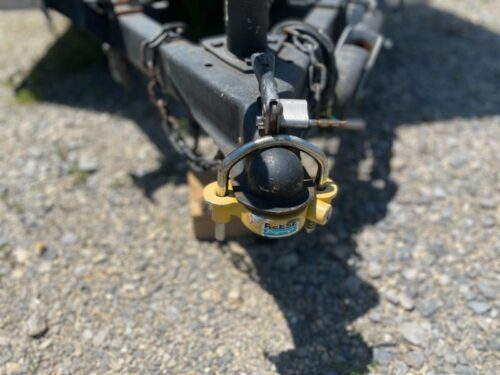There’s no greater pastime than parking your RV beneath a cottonwood or sycamore tree and dipping your line in the water. Take it from me – I’ve taken road trips all over North America, and I go out of the way to cast my line in the local water at least once.
But fishing while RVing does come with challenges. These include understanding local fishing licenses and regulations, where to store rods and equipment, and finding the best RV fishing locations.
Lucky for you, I’ve taken the guessing out of fishing on the go with this handy guide to fishing while traveling in your RV.
DO I REQUIRE AN OUT-OF-STATE FISHING LICENSE?
No matter where you travel, you should always abide by the local fishing laws. Once you have purchased a fishing license, keep it on hand. Or have a digital copy/email on your phone in case you are accosted by the local authorities. Whether you’re hunkering down at a resort or staged along a riverfront park, the authorities can ask you for documentation at any time. (Alas, nothing puts a damper on a trip quite like a fine.)
The type and cost of the license will vary with where you are located. Most regions have the option for non-residents to purchase a single-day or three-day license. If you are traveling with children, most fishing localities allow children under the age of 16 to fish for free. However, this is not always the case, so double-check!
So, make it a habit to double-check in advance. If you are unsure, check the state government website for the most accurate and the most up-to-date information. Here’s a summary of fishing regulations by state.
WHAT GEAR SHOULD I BRING WITH ME?
Reels, Rods and Spinners, Oh My!
Having a spinning rod and reel combination works on all bodies of water, whether you are on a river, reservoir, or lake. However, if you are fishing between saltwater and freshwater systems, make sure to rinse off your gear after saltwater use. This will increase the longevity of your gear and prevent erosion of mechanisms down the line.
This was a hard lesson for me when I was in Nova Scotia several summers ago, salmon and mackerel fishing. After not rinsing it after saltwater use, my rod and reel components began to rust and break down. My beloved telescope travel rod was ruined.
P.S. If you’re crunched for space, check out a telescoping fishing pole, or even a cult classic like the Pocket Fisherman.
What Do I Need for a Portable Fishing Tackle Box?
My dog got a lure in her foot last year because the lure wasn’t in a hardshell tackle box. She was okay, but it was my fault for not being more careful. A hardshell tackle box with dividers will protect yourself, your children, or your pets from being hooked. Take it from me (and my dog!) when I express the need for safety here.
A basic universal tackle box will include an assortment of the following:
- Hooks and sinkers
- Monofilament line
- Soft plastic baits (worms, swimbait, tubes, etc.)
- Hard bait (topwater bait, crankbait, deep divers, suspended lures, etc.)
- Spinners and spoons
- Swivel hooks and leaders
- Bobbers
To protect yourself and the fish you’ve reeled in, it’s ideal to have a landing net. For storage purposes, you will want to consider a folding landing net.
Alternatively, if you are on the road, chances are you already have a toolbox in your RV. Add a pair of needle-nose pliers to your tackle gear to allow the safe removal of hooks with ease. (Don’t forget that some species of fish have teeth. It doesn’t take a genius to figure out that you don’t want to use your fingers to remove hooks!)
Finally, if you plan to keep your catch, you will want a fillet knife to slice the meat instead of hacking it up.
RV Hot Tips
- Bring along an outdoor grille; it’s much more enjoyable to cook fish outside than cramped inside your RV kitchen! Plug a portable grill, like a Blackstone, to the quick-connect fitting on your LP manifold.
- Don’t forget the ice! RV absorption refrigerators may not work well enough to keep your fish cold for long periods of time, especially while traveling. Bring along some ice to make sure the fish stays cold and fresh.
- Keep your RV cool. You can help keep your RV cool by adding insulated window covers, motorhome windshield shades, and parking in the shade.
WHAT ABOUT CLEANING AND COOKING?
Follow Animal Safety Protocols
Some RV resorts have infrastructures in place for cleaning your catch. During my travels, I’ve come across fish cleaning stations that are only a single table with a trashcan. Or the campground offers a screened-in room with a fridge full of skinned leftovers. This will vary depending on many scenarios. But the infrastructures usually mirror if predators are present such as bears, coyotes, or mountain lions. Follow bear safety protocol, especially if you’re camping in the Pacific Northwest or Colorado Rockies!
Fish Cleaning Campground Etiquette
Something to keep in mind is to always have a bag (Ziploc or grocery) on hand to put your newly filleted meat away. You wouldn’t want to be in a situation where you have to carry exposed fish fillets around a campground. Discard the carcass in the trash or refrigerator if that’s how the site handles its garbage. Use a hose, water station, or wipes, to clean off the area when you’re done. Follow the appropriate etiquette
If there is no fish cleaning station, clean off and gut the fish on the shoreline. Have a bag on hand to store organs and carcasses, or in a garbage can, or dispose of them there. Place fillets in the alternative bag and wash off the area.
It’s important to note that filleting a fish should never be done at camp! Even if you wash your area well, animals have a well-tuned sense of smell, and you will attract unwanted visitors.
WHERE TO STORE FISHING GEAR IN YOUR RV?
Here’s another hard lesson learned from the road: When packing up from a site, it’s best to store your rod in a hard-shell rod case. These come in a variety of shapes and sizes, and you may not have to disassemble your rod entirely. The protective shell prevents the eyelets where the line feeds through from being damaged.
When on the move, there’s always the chance that something may fall or swing in an RV. This is also the reason you should consider a hard-shell tackle box for storing lures. While on the go, most tackle boxes can be stored in a sliding drawer, cupboard, or under a seat.
If you prefer to keep the smell of the outdoors, well, outdoors, store everything in your basement or pass-through storage compartments. Line the storage areas with a cheap plastic tarp to keep salt water from soaking into your subfloor.
If you’re out of room inside your storage compartments, consider lashing your fishing pole to your ladder rungs. Or here’s another popular modification: Fasten a telescoping sewer tube holder underneath your frame, and store your fishing poles in there!
WHERE ARE THE BEST RV RESORTS TO GO FISHING?
River RV Park, Missouri
Many RV resorts and campgrounds can be located near a body of water. For Instance, River RV Park in the Lake of the Ozarks caters specifically to RVers and anglers alike. The facility has its own stocked pond and private riverbanks for fishing. If you’re hauling a boat, the campground has a boat launch and dock.
It’s important to note that if you decide to visit Missouri for fishing, a fishing license will be required regardless of age. But don’t leave without targeting one of the record-breaking blue catfish or channel catfish that Lake Ozark has a claim to fame for.
Fishing Bridge RV Park, Wyoming
Yellowstone National Park, on the other hand, has been a popular camping and fishing destination for over 100 years. Hence, Fishing Bridge RV Park is a world-renown leisure spot that offers campers a fishing pier at their doorstep. Anglers must apply for a national park-specific fishing license in advance and comply with gear restrictions such as barbless hooks. But, with sought-after species such as cutthroat trout and the famous Steamboat and Old Faithful geysers a short distance away, it makes for a memorable location.
Kenai Riverside Campground, Alaska
If you want to escape to a destination with breathtaking scenery and some of the best salmon fishing, look no further than Alaska’s Kenai Peninsula. Nestled on the banks of the Kenai River with a mountain backdrop is Kenai Riverside Campground and RV Park. Non-residents 16 years of age and older will need a fishing license and, if applicable, a King Salmon stamp. This region also offers target species such as flounder, halibut, rainbow trout, dolly varden, and arctic grayling.
Big Pine Key Resort
No fishing and RV guide would be complete without the mention of Florida. The Florida Keys have a claim to being the “sport fishing capital of the world.” This is due to the push of the warm Gulfstream water between the Atlantic Ocean and Florida Bay. Species like sailfish, marlin, swordfish, mahi-mahi, and tuna can’t stay away! Big Pine Key Resort offers waterfront sites and water recreation. Plus, if you’re hauling a boat, you can purchase a boat slip for your fishing needs.
PULLING IN THE LINE
There you have it: My guide to fishing while traveling in your RV!
I cannot express how many hidden gems or off-the-beaten-path fishing holes I’ve come across while traveling. It’s important to keep in mind that this guide only scratches the surface of America’s favorite pastime. But one thing is for sure: When you’re on the road, the next great adventure is around the corner and under the surface.
Alexis Towle is a hospitality staff turned camping addict. She traded hotel check-ins for the RV pull-ins. A digital nomad based out of Niagara Falls, ON during the day turned outdoors enthusiasts at night. She’s the girl you never see at a campground because she’s hitting the trails and pulling in the fish. Alexis has been all over North America from Florida, Dominican Republic, Aruba, and Costa Rica. But when she does get some downtime, it’s usually in the presence of her adorable Jack Russell, Lady.
-
This author does not have any more posts.









